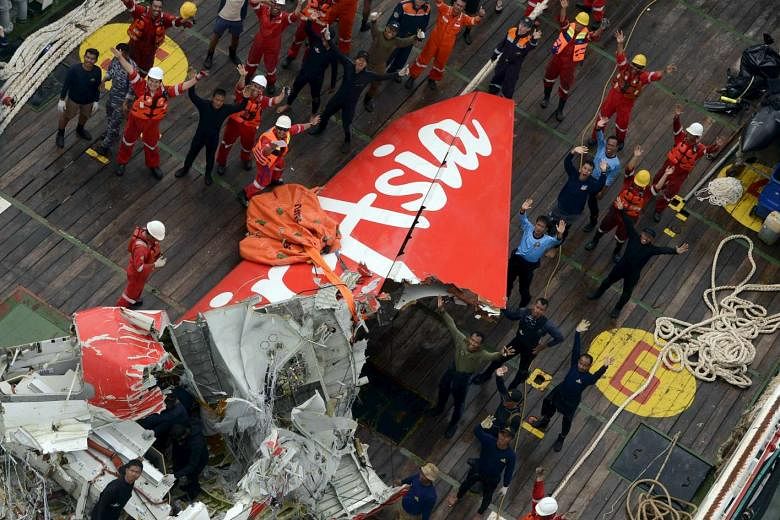The two pilots at the controls of ill- fated AirAsia QZ8501 may not have been adequately trained to handle the Airbus A320-200 aircraft under certain emergency conditions, according to air-crash investigators.
Indonesia's National Transportation Safety Committee (KNKT) said this was because Airbus did not anticipate that the A320 would be in an "upset condition", aviation- speak for when a plane goes into a steep roll and is destabilised.
KNKT lead investigator Nurcahyo Utomo said the Airbus' flight training manual for the A320 states that it will not enter an upset condition.
"Therefore an upset recovery training is considered not required," said Mr Nurcahyo yesterday, during the release of the committee's report on the Dec 28 crash. "We have recommended to Airbus to carry out training to all Airbus pilots worldwide."
The pilots of QZ8501, Captain Iriyanto and First Officer Remi Emmanuel Plesel, went down with the plane together with the other 160 people on board.
Capt Iriyanto, who is Indonesian, was a former fighter pilot who had logged 20,537 hours of flight time.
First Officer Plesel, a Frenchman, had 2,275 hours of flight experience.
Despite their combined experience, the KNKT said the pilots lost control of the aircraft, sending it into a rapid ascent before stalling and crashing into the Java Sea.
They were trying to resolve a fault with the aircraft's rudder system manually when things went awry.
The KNKT said data from the flight recorder ruled out any impact on the aircraft from stormy weather conditions, effectively pointing to a confluence of technical faults and human error for causing the crash.
Although the committee stated that its investigation was not designed to assign blame but rather to prevent a repeat of such incidents, the findings threw up more questions with regard to the maintenance regime of aircraft and pilot training globally.
Airbus, responding to queries yesterday, said it has received the final accident report and is "now carefully studying its content".
AirAsia chief executive Tony Fernandes said yesterday that there was much to be learnt for AirAsia, the manufacturer and the aviation industry.
"My heart and deep sorrow goes out to all the families involved in QZ8501," he said.
A spokesman for the budget carrier said that following the crash, AirAsia has enhanced its safety standards and introduced new initiatives including upset recovery training and additional simulator training sessions to get pilots up to speed with a system that provides real-time monitoring on aircraft fault messages.
The efforts of the airline, however, remain cold comfort to some families of the victims of the crash.
Mr Eka Santoso, a 52-year-old engineer, who lost his brother who was travelling with his wife and two children, said there seems to be a "big hole on AirAsia's part".
"They committed a gross negligence; we will meet with fellow families of the victims and will announce our stance," he added.
"The investigation report has given us confidence to decide what our next step is. The airline is at fault, not the pilots. It is clear that it started with a technical problem. A problem that occurred repeatedly and was ignored."

